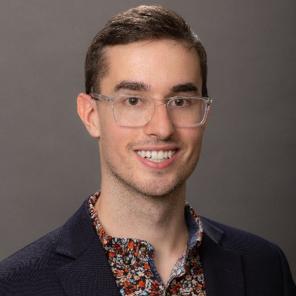
Dr. Marshall Padilla received his Bachelor of Science in Chemistry from the College of William & Mary and his Ph.D. in Chemistry from the University of Wisconsin-Madison. Currently, he is a postdoctoral fellow at the University of Pennsylvania’s Bioengineering Department in the Mitchell Lab as well as a member of the University of Pennsylvania’s Center for Innovation & Precision Dentistry, where he recently finished a T90 fellowship. At the 2024 AADOCR Annual Meeting, he won the Postdoctoral Hatton Award Competition for his work on multitherapeutic lipid nanoparticles for oral squamous cell carcinoma. Outside of the lab, he enjoys playing ultimate frisbee and taking naps.
Please briefly describe your background and research interests.
I have a unique background due to my experiences as a small molecule synthetic chemistry who mainly applies their expertise for devising novel biomaterials for drug delivery vehicles. I have established a multidisciplinary research portfolio that involves fundamental studies on identifying structure-function relationships of nanoparticles as well as utilizing state-of-the-art solution-based biophysical methods to characterize these nanoparticles. I use the principles I have identified to construct formulations for a wide range of applications, including liver gene editing, CAR T-cell therapy, stem cell reprograming, and next-generation vaccines. Currently, I am developing a lipid nanoparticle platform, the vehicle for the mRNA COVID-19 vaccines, to deliver anticancer mRNA and chemotherapeutics to treat oral squamous cell carcinoma.
What has been the most valuable benefit of AADOCR membership to you?
The AADOCR membership is my gateway to, what is for me, new scientific fields. As an outsider who only recently began researching in the oral space, I constantly felt behind as I had so much to learn and knew almost no one. But, with the AADOCR membership, I have incrementally begun forming an amazing community of oral health researchers from all throughout the U.S. Also, AADOCR has many incredible opportunities, including the MIND the Future program and the Hatton Award Competition, which are fantastic ways to build professional networks and engage in professional development.
What was the biggest impact the AADOCR Mind the Future Program had on you, either personally or professionally?
The MIND the Future program is a stellar opportunity for any junior researcher, regardless of their background. It is an opportunity to receive training in grant writing, mentoring, and work-life balance as well as become part of a diverse community of up-and-coming dental and oral health researchers. Thus, MIND the Future has had a major impact on me both professionally and personally as I feel more prepared to transition to an academic position and feel more comfortable knowing I have the support of the many friends I have made through the program.
Are you going to next year’s AADOCR Annual Meeting in New York? If so, which parts are you most looking forward to?
Definitely! As part of the MIND the Future program, the main way we see each other in person is through the Annual Meetings, so I am eagerly waiting for the opportunity to see everyone. Moreover, as I am slowly becoming part of the oral cancer community, I am excited to see the incredible research that people have been working on since the last meeting, it truly inspires me. Lastly, of course I will be going to the expo, I try to get as many free samples as I can for my lab. It is also fun to see what new products cause the most commotion – this year it was the chocolate toothpaste.
What is the best way for other members to become more involved in AADOCR?
Attend the annual meetings and find for your community! The bevy of travel grants that the AADOCR provides makes traveling to national meetings more affordable than other national meetings. At the annual meetings, there are so many wonderful people with diverse backgrounds and experiences, so it is easy to find your niche, whether it is in a research subfield, volunteering organization, or industry partner. To help facilitate this, I recommend reaching out to AADOCR veterans at your local university or organization who can help connect you during the Annual Meeting.




